UK Recognition of Palestine as a State: Comprehensive Analysis of Global Complications and Ramifications
On September 21, 2025, British Prime Minister Sir Keir Starmer made the historic announcement that the United Kingdom formally recognizes Palestine as a state, marking a dramatic shift in British foreign policy that has sent shockwaves across the international community. This decision, announced alongside similar declarations by Canada, Australia, and Portugal, represents the first time major G7 nations have taken such a step, fundamentally altering the diplomatic landscape of the Israeli-Palestinian conflict and creating a cascade of complications with far-reaching implications for the UK, Europe, the United States, Israel, and the broader international order.
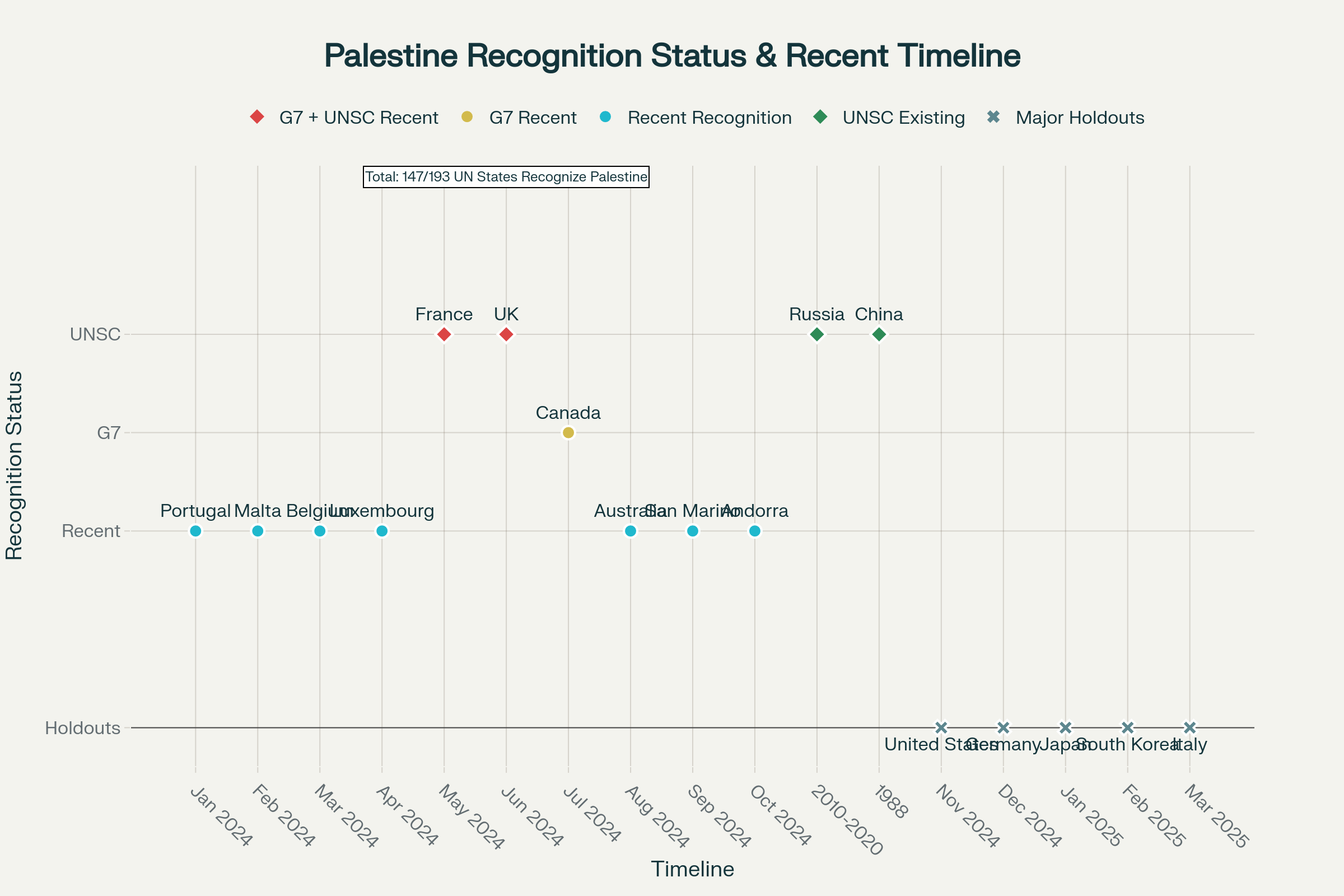
Palestinian State Recognition: Global Status and Recent Western Recognition Wave (2024-2025)
The timing of this recognition—occurring just two days before the UN General Assembly’s annual session and amid Israel’s ongoing military operations in Gaza—has created an immediate diplomatic crisis that threatens to reshape alliances, economic relationships, and security partnerships that have defined Western policy in the Middle East for decades. The decision carries profound implications that extend far beyond symbolic diplomacy, potentially triggering a fundamental realignment of international relations and challenging the foundational assumptions of post-World War II diplomacy.
Historical Context and Immediate Triggers
The Balfour Declaration Legacy
The UK’s recognition of Palestinian statehood occurs 108 years after the infamous Balfour Declaration of 1917, in which Britain pledged support for establishing a “national home for the Jewish people” in Palestine. This historical parallel has not been lost on observers, with Palestinian Ambassador to the UK Husam Zomlot describing the recognition as “righting historic wrongs” and correcting injustices dating back over a century. The decision represents a dramatic reversal of Britain’s historical role as the architect of modern Israel, creating what many view as a profound moral and political reckoning with colonial-era policies that continue to shape Middle Eastern geopolitics.
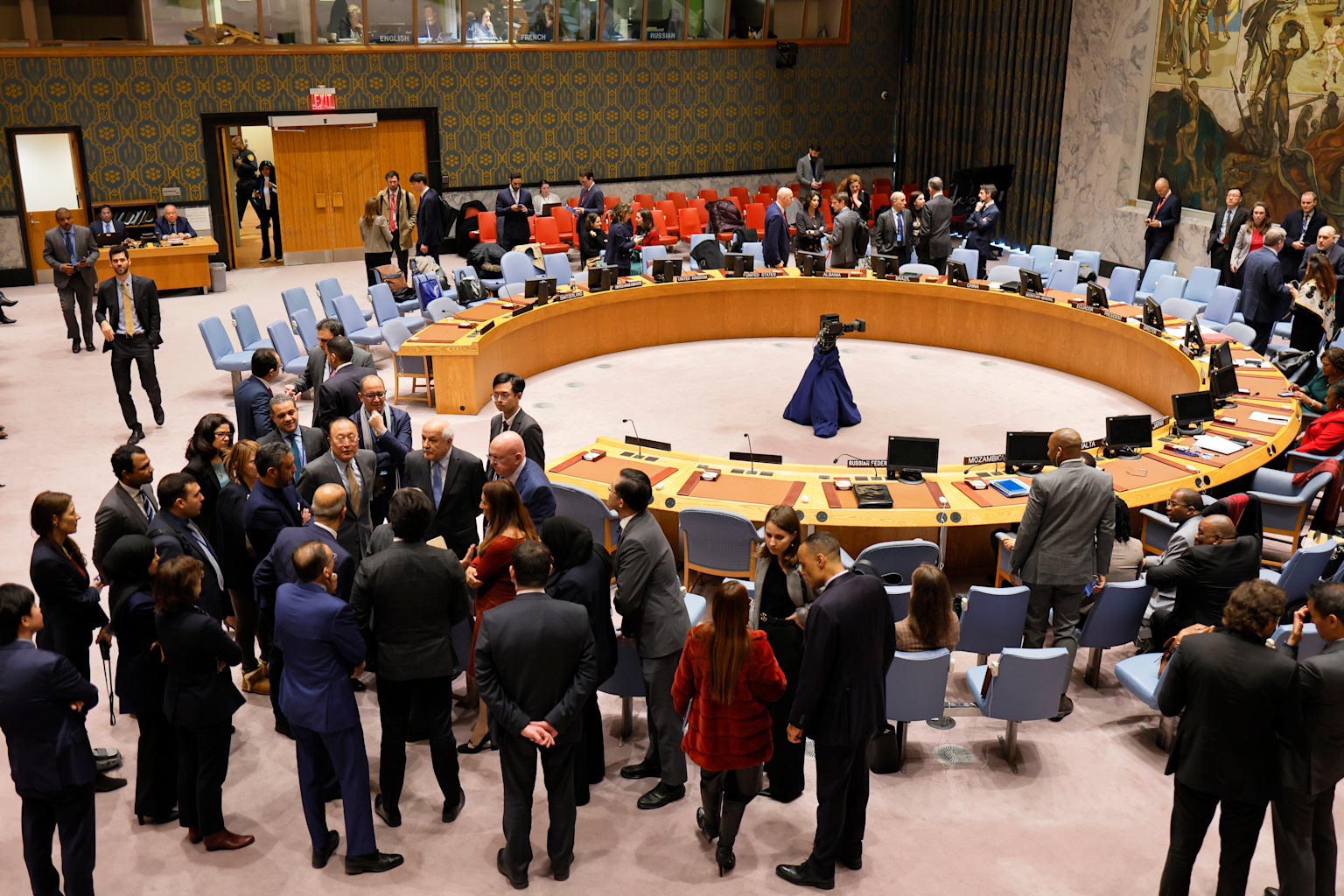
A view inside the United Nations Security Council chamber with diplomats engaging in discussions around the horseshoe-shaped desk setup
The recognition comes after Prime Minister Starmer’s July ultimatum to Israel, demanding substantial steps toward peace including a ceasefire in Gaza, increased humanitarian aid access, and meaningful progress toward a two-state solution. Israel’s failure to meet these conditions, combined with the deteriorating humanitarian situation in Gaza and mounting domestic political pressure, ultimately prompted the UK’s historic decision. This conditional approach demonstrates how the recognition serves as both a diplomatic tool and a response to Israel’s continued military operations, which have resulted in over 65,000 Palestinian deaths according to health authorities.
International Coordination and Diplomatic Strategy
The synchronized nature of the recognition—with the UK, Canada, Australia, and Portugal announcing their decisions within hours of each other—suggests extensive diplomatic coordination aimed at maximizing international impact. France’s subsequent recognition, along with planned announcements from Belgium, Luxembourg, Malta, San Marino, and Andorra, indicates a broader Western strategy to present Israel with a unified front of opposition to its current policies. This coordinated approach represents a significant departure from the traditionally fragmented Western response to Middle Eastern conflicts, suggesting a new level of diplomatic cooperation aimed at pressuring Israel to change course.
The timing of these announcements, just before the UN General Assembly session, was clearly designed to create maximum diplomatic pressure and establish momentum for broader international action. With over 150 nations now recognizing Palestine, the recent Western recognitions bring the total close to 160 UN member states, representing an overwhelming majority of the international community and potentially paving the way for renewed attempts at full UN membership for Palestine.
Immediate Ramifications for the United Kingdom
Domestic Political Implications
The recognition represents a significant political victory for Prime Minister Starmer, who faced mounting pressure from over one-third of Labour MPs who had written to him demanding Palestinian recognition. However, the decision also carries substantial domestic political risks, with Conservative leader Kemi Badenoch condemning it as “absolutely disastrous” and accusing Starmer of “rewarding terrorism with no conditions whatsoever put in place for Hamas”. These stark partisan divisions reflect deeper tensions within British society over the Israeli-Palestinian conflict and may influence future electoral dynamics.
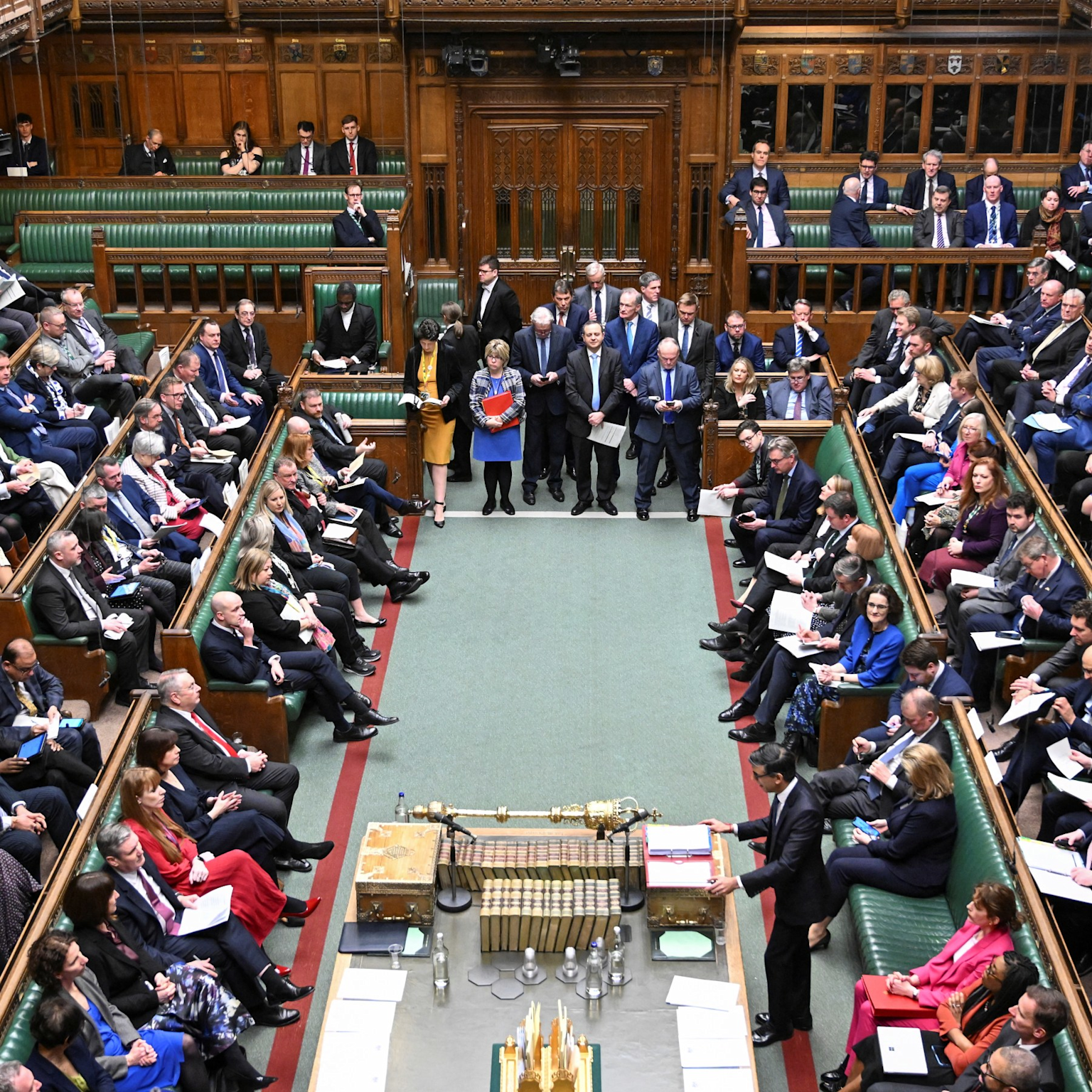
UK Parliament’s House of Commons during a session likely debating a Middle East foreign policy issue
The decision has also exposed tensions within the Labour Party itself, with some MPs supporting even stronger measures including arms embargoes and economic sanctions against Israel. The Trade Union Congress (TUC) has called for suspension of the UK-Israel trade deal, arguing that current measures are “clearly not working” and that it is “plain wrong” for goods from Israel to be imported with reduced tariffs given ongoing violations of international law. These pressures suggest that recognition may be only the first step in a broader reassessment of UK-Israel relations, potentially leading to more substantive economic and diplomatic measures.
Economic and Trade Consequences
The UK’s recognition threatens to disrupt significant economic relationships, particularly the £6 billion annual trade between Britain and Israel. The 2030 Roadmap for UK-Israel Bilateral Relations, signed in 2023, established extensive cooperation across defense, technology, cyber security, and trade sectors, making Israel one of the UK’s most important strategic partners. The recognition decision puts these relationships at risk, potentially affecting over 400 Israeli tech firms operating in the UK and threatening collaborative projects in critical sectors including defense technology, artificial intelligence, and cybersecurity.
The UK’s trade relationship with Palestinian territories, while significantly smaller at £52 million annually, could see expansion following recognition. However, the primary economic implications stem from potential Israeli retaliation and the broader disruption of Middle Eastern trade relationships. The UK government’s decision to change official terminology from “Occupied Palestinian Territories” to “Palestine” on Foreign Office websites signals a fundamental shift that could affect everything from bilateral agreements to international arbitration procedures.
Defense industry relationships face particular scrutiny, with the UK’s extensive reliance on Israeli military technology now subject to ethical questioning. The controversial Watchkeeper UAV program, based on Israeli Hermes 450 technology and costing £800 million, exemplifies the complex interweaving of UK and Israeli defense capabilities. These relationships, which have been central to UK defense modernization efforts, now face potential disruption amid growing calls for arms embargoes and suspension of military cooperation agreements.
Legal and Constitutional Complications
The recognition creates complex legal implications for UK domestic and international law. Questions arise regarding the status of existing agreements, contracts, and legal arrangements with Israeli entities, particularly those involving activities in areas now recognized as part of Palestine. The UK’s recognition effectively challenges the legal basis for Israeli settlements and annexation policies, potentially requiring reassessment of trade agreements, investment protections, and judicial cooperation frameworks.
International legal experts note that recognition strengthens Palestine’s position in international courts and tribunals, potentially affecting ongoing cases at the International Criminal Court (ICC) and International Court of Justice (ICJ). The UK’s support for Palestine’s legal standing could influence future war crimes prosecutions and international arbitration cases, creating additional diplomatic complications with Israel and its supporters.
Impact on US-UK Relations and Transatlantic Alliance
Divergence from American Policy
The UK’s recognition creates the most significant divergence between British and American foreign policy in decades, directly contradicting President Trump’s stated opposition to Palestinian statehood. During Trump’s recent visit to London, he explicitly stated his disagreement with Starmer on Palestinian recognition, highlighting the growing rift between traditional allies. The US State Department’s characterization of Western recognition efforts as “performative gestures” underscores the depth of American opposition and suggests potential consequences for the broader transatlantic relationship.
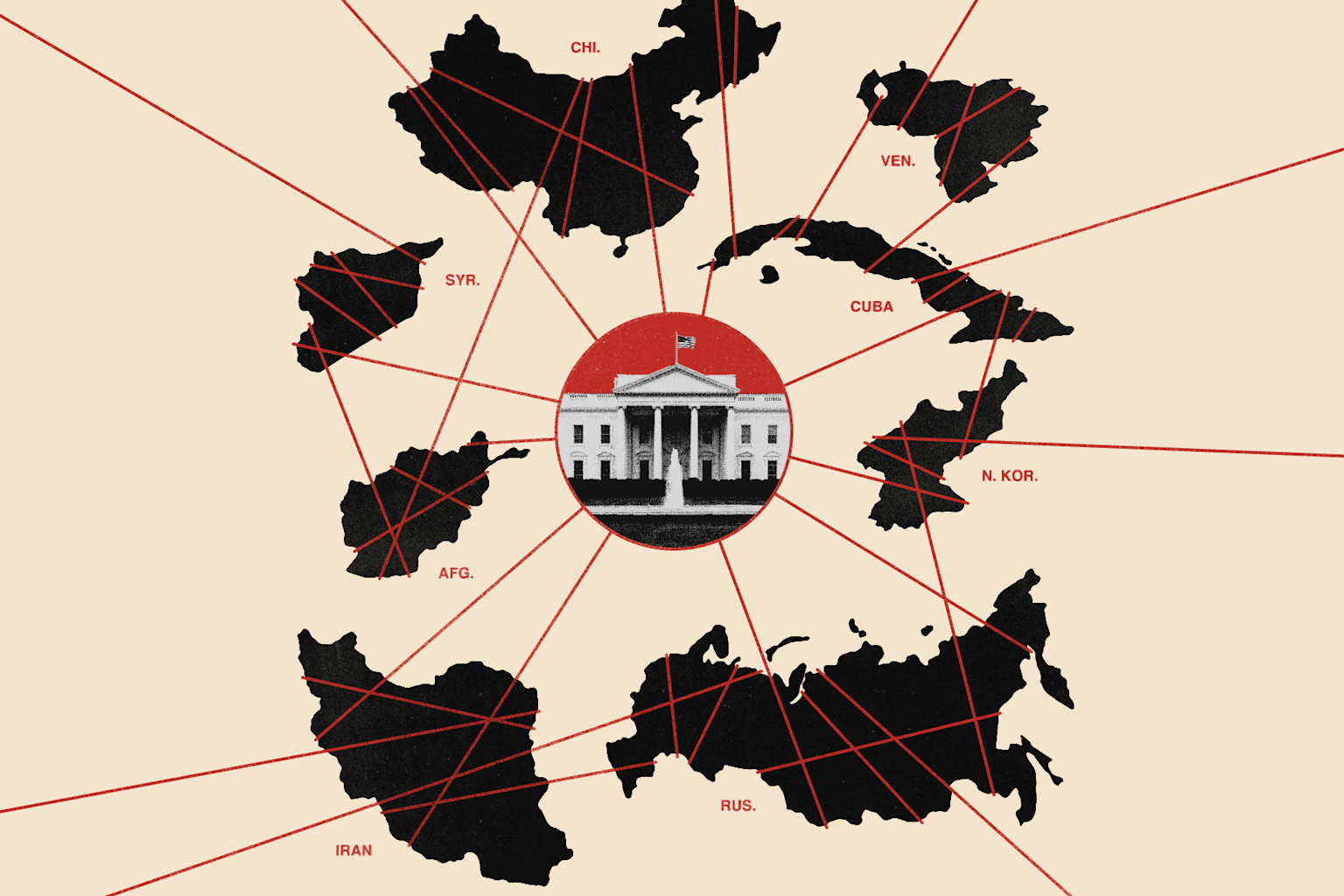
White House connected to multiple countries symbolizing U.S. economic sanctions and geopolitical influence
This policy divergence threatens to undermine the “special relationship” between the UK and US, potentially affecting cooperation on broader global issues including NATO operations, intelligence sharing, and coordinated responses to challenges from Russia and China. American officials have made clear that their priorities remain “the release of hostages, the security of Israel, and peace and prosperity for the entire region that is only possible free from Hamas,” directly contradicting the UK’s approach of recognizing Palestine while Hamas remains in control of Gaza.
The rift extends beyond bilateral relations to affect multilateral institutions and alliance coordination. US opposition to Palestinian recognition has already been demonstrated through vetoes in the UN Security Council, and American pressure on allies to reverse or prevent recognition efforts could create ongoing tensions within NATO and other Western institutions. Republican criticism of allied recognition efforts as “caving to Hamas” suggests that the policy divergence could become a significant issue in US domestic politics, potentially affecting future American support for European initiatives.
NATO and Security Alliance Implications
While NATO itself has not directly addressed Palestinian recognition, the policy divergence between major alliance members creates potential complications for collective decision-making and strategic coordination. The UK’s decision comes at a time when NATO faces multiple challenges including the ongoing war in Ukraine, tensions with Russia and China, and internal divisions over defense spending and burden-sharing. Adding Middle Eastern policy divisions to these existing strains could complicate alliance unity and effectiveness.
The UK’s extensive defense cooperation with Israel, including joint training, intelligence sharing, and weapons development programs, may face pressure for reduction or elimination following Palestinian recognition. These changes could affect NATO’s overall capabilities and interoperability, particularly in areas where Israeli technology and expertise have been integrated into alliance systems. The recognition decision also raises questions about NATO’s approach to Middle Eastern partnerships and engagement with non-member states in the region.
Intelligence sharing arrangements, which have been crucial to counterterrorism efforts and regional stability operations, may face scrutiny and potential restrictions. The Five Eyes intelligence alliance, which includes the UK, US, Canada, and Australia, could experience tensions as three of its members (UK, Canada, Australia) have now recognized Palestine while the US maintains firm opposition. These intelligence relationships have been fundamental to Western security cooperation, and their disruption could have broader implications for global security efforts.
European Union Response and Continental Implications
EU Division and Policy Fragmentation
The recognition wave has exposed significant divisions within the European Union, with member states taking dramatically different approaches to Palestinian statehood. While France, Belgium, Luxembourg, Malta, and other EU members have joined the recognition effort, Germany—the EU’s largest economy—remains firmly opposed, along with Italy and several Eastern European states. This fragmentation undermines EU common foreign policy objectives and raises questions about the bloc’s ability to speak with one voice on critical international issues.
The EU’s inability to reach consensus on Palestinian recognition reflects broader challenges in European foreign policy coordination, particularly regarding Middle Eastern issues where member states have different historical relationships, security concerns, and domestic political pressures. Spain, Ireland, and Norway’s earlier recognition efforts in 2024 began this fragmentation process, but the addition of major powers like the UK and France has dramatically accelerated European policy divergence.
These divisions have practical implications for EU-Israel relations, including the Association Agreement, trade relationships, and research cooperation programs like Horizon Europe. Some member states are calling for suspension of EU-Israel agreements, while others maintain that cooperation should continue despite policy disagreements. This lack of unity weakens the EU’s leverage with both Israel and Palestine, potentially reducing European influence in future peace negotiations.
Economic Integration and Trade Consequences
The European Union is Israel’s largest trading partner, making European recognition decisions particularly significant for Israeli economic interests. The potential for expanded economic sanctions, trade restrictions, or suspension of preferential trading arrangements could substantially impact Israeli economic growth and development. Conversely, recognition could open new opportunities for economic cooperation with Palestine, though the practical limitations imposed by Israeli control over Palestinian territories would limit immediate benefits.
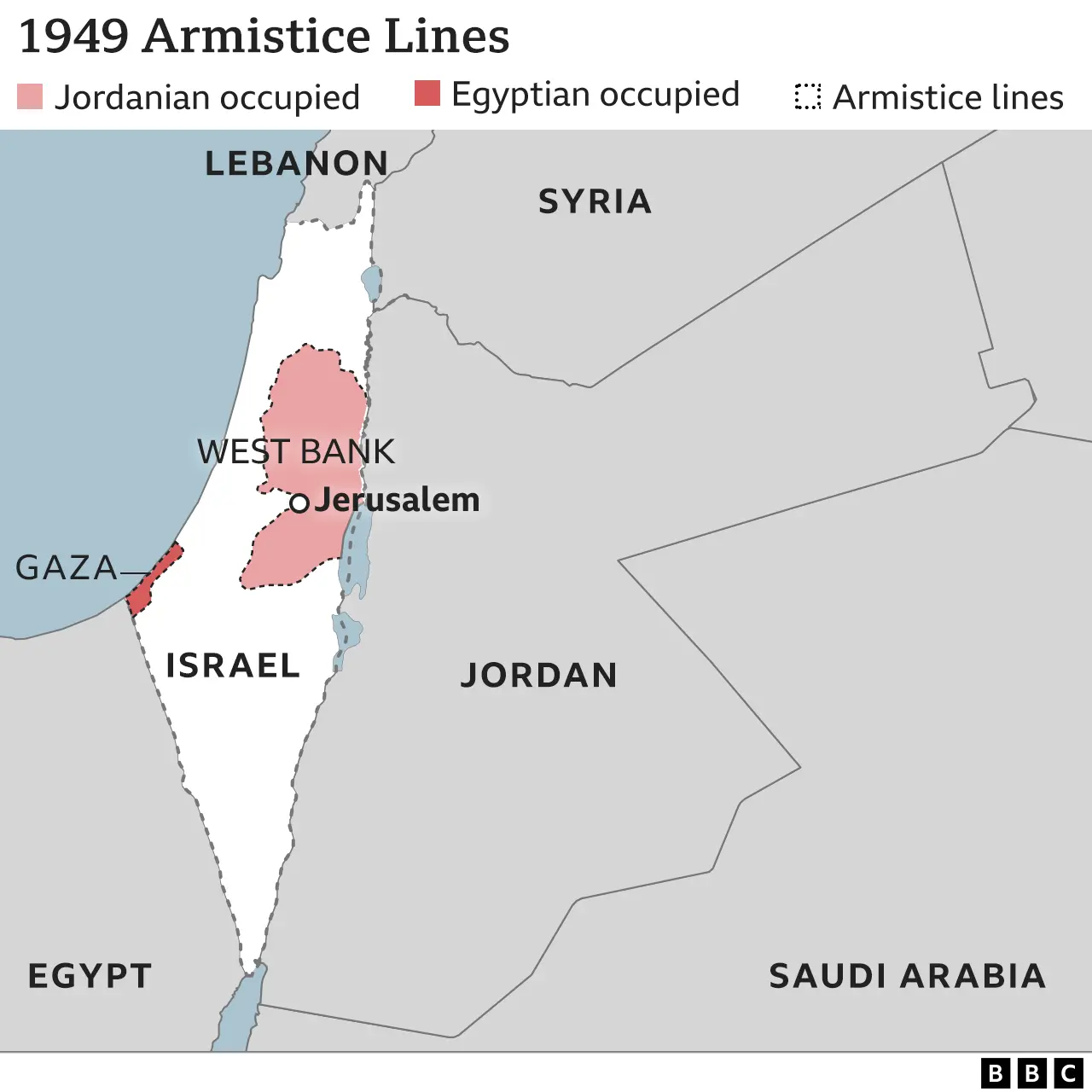
Map showing the 1949 armistice lines and the Jordanian and Egyptian occupied territories in the West Bank and Gaza regions, providing historical context to the Israel-Palestine conflict
European defense cooperation with Israel also faces potential disruption, particularly as several EU member states reassess their military relationships following recognition decisions. The European Defence Fund and other EU defense initiatives may face pressure to exclude Israeli companies or technologies, potentially affecting European defense capabilities and industrial partnerships. These changes could reshape the European defense industrial base and affect the EU’s strategic autonomy objectives.
The recognition wave has also prompted calls for boycotts, divestment, and sanctions (BDS) campaigns to be strengthened across Europe, potentially affecting Israeli companies’ access to European markets and investment opportunities. While BDS efforts have had limited economic impact historically, the political momentum generated by state recognition could provide new impetus for grassroots economic pressure campaigns.
Israeli Response and Strategic Implications
Government and Political Reactions
Israeli Prime Minister Benjamin Netanyahu’s response to the recognition wave has been swift and uncompromising, declaring that “there will be no Palestinian state west of the Jordan River” and promising a strong Israeli response upon his return from the United States. Netanyahu’s characterization of recognition as “a huge reward to terrorism” following the October 7, 2023 Hamas attacks reflects the Israeli government’s view that recognition undermines security and rewards extremist violence.
The recognition decisions have prompted calls from Israeli far-right ministers for immediate annexation of parts of the West Bank, with National Security Minister Itamar Ben-Gvir stating his intention to present cabinet proposals for implementing Israeli sovereignty over Palestinian territories. These annexation threats represent a dramatic escalation that could further destabilize the region and provoke additional international sanctions or recognition decisions by currently uncommitted nations.
Israeli opposition leader Yair Lapid has criticized both the international recognition and the Netanyahu government’s response, arguing that effective Israeli diplomacy could have prevented the recognition wave. This internal political division reflects broader Israeli concerns about the country’s international isolation and diplomatic effectiveness, particularly as traditional allies increasingly diverge from Israeli policy preferences.
Military and Security Implications
Israel’s response options to the recognition wave are constrained by practical limitations and international law considerations, but several scenarios could dramatically escalate regional tensions. The threatened annexation of West Bank territories would likely trigger additional sanctions and recognition decisions, potentially including from currently uncommitted major powers like Germany and Japan. Such actions could also destabilize the Abraham Accords and normalization efforts with Arab states, particularly Saudi Arabia, which has warned that annexation would have “major implications”.
Military escalation options remain available to Israel, including expanded operations in Gaza, increased settlement construction, or restrictions on Palestinian movement and economic activity. However, these responses would likely generate additional international criticism and potentially trigger more comprehensive sanctions regimes. Israel’s strategic calculation must balance short-term defensive reactions against longer-term diplomatic isolation and economic costs.
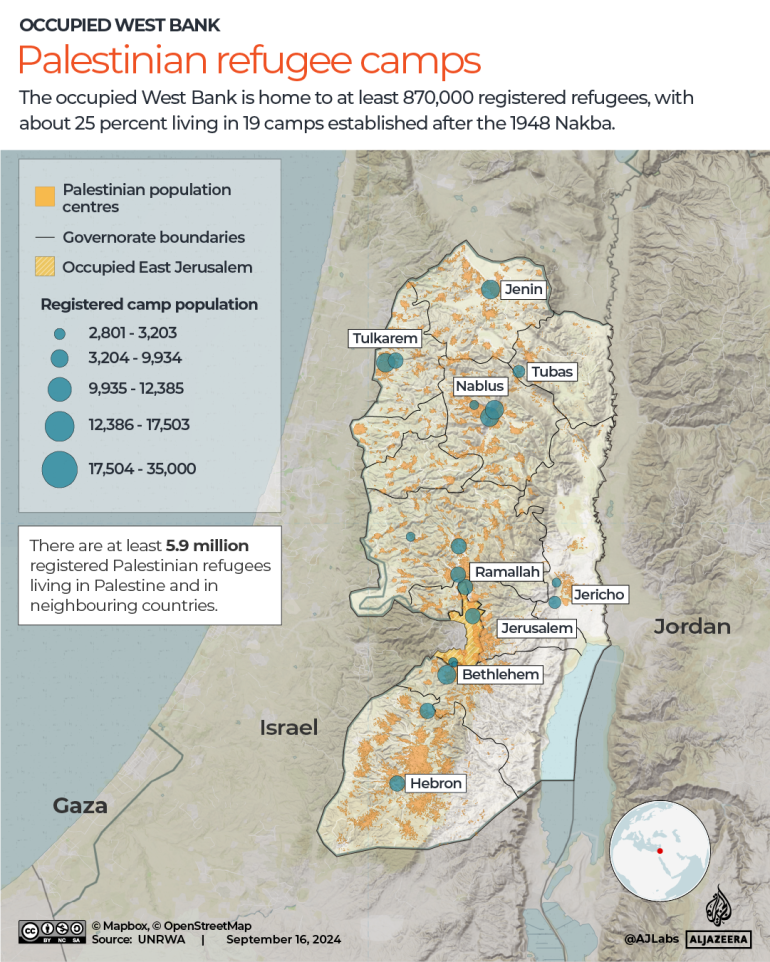
Map of the occupied West Bank showing Palestinian refugee camps, population centers, and governorate boundaries with population sizes indicated for each camp
The recognition wave also affects Israel’s security partnerships with recognizing countries, potentially limiting intelligence sharing, joint training, and weapons procurement relationships. The UK’s extensive defense cooperation with Israel, valued at billions of pounds annually, faces particular scrutiny as calls grow for suspension of military relationships with states that no longer recognize Israeli sovereignty over Palestinian territories.
International Isolation and Alliance Erosion
The growing number of recognizing states represents a fundamental challenge to Israel’s international legitimacy and diplomatic strategy. With nearly 160 UN member states now recognizing Palestine, Israel faces increasing isolation in international forums and potential exclusion from various multilateral initiatives and organizations. This isolation could affect everything from trade relationships to participation in international scientific and cultural exchanges.
The erosion of Western support represents a particularly significant challenge for Israel, which has historically relied on American and European backing for international legitimacy and economic relationships. The participation of G7 members and UN Security Council permanent members in the recognition wave signals a fundamental shift in great power politics regarding the Israeli-Palestinian conflict. This change could affect Israel’s ability to prevent Palestinian UN membership, influence international legal proceedings, and maintain preferential trading relationships with developed economies.
Israel’s diplomatic strategy now faces the challenge of preventing additional recognition decisions while managing relationships with countries that have already recognized Palestine. The traditional Israeli approach of leveraging American support to pressure allies may prove insufficient given the scale and coordination of the recognition wave, requiring new diplomatic strategies and potentially significant policy concessions to prevent further international isolation.
Middle Eastern Regional Consequences
Arab State Reactions and Abraham Accords Impact
The recognition wave has generated positive reactions across the Arab world, where Palestinian solidarity remains a fundamental political principle despite recent normalization efforts with Israel. Saudi Arabia’s role in co-hosting the UN two-state solution summit alongside France demonstrates the kingdom’s continued commitment to Palestinian statehood, potentially complicating ongoing normalization negotiations with Israel. The UAE and other Abraham Accords signatories face pressure to reassess their relationships with Israel in light of growing international recognition of Palestine.
The recognition decisions could destabilize the Abraham Accords framework, which was predicated on de-emphasizing Palestinian issues in favor of broader regional cooperation against Iran. With Palestine returning to the center of international attention and major Western powers supporting statehood, Arab states may find it politically difficult to maintain warm relationships with Israel while the Palestinian issue remains unresolved. This dynamic could reverse years of diplomatic progress and return the region to more traditional alliance patterns based on the Israeli-Palestinian divide.
Iran’s response to the recognition wave has been supportive but calculated, seeing an opportunity to further isolate Israel while avoiding direct confrontation. Iranian officials have used the recognition decisions to argue that resistance to Israeli occupation is gaining international legitimacy, potentially emboldening proxy groups and complicating regional de-escalation efforts. The intersection of Palestinian recognition with broader Iran-Israel tensions could create additional flashpoints for regional conflict.
Security Architecture Implications
The recognition wave could affect regional security arrangements, particularly cooperation frameworks that include both Israel and Arab states. Intelligence sharing arrangements, counterterrorism cooperation, and joint military exercises may face political pressure as Palestinian recognition changes the diplomatic landscape. These security relationships have been crucial for regional stability, particularly in countering Iranian influence and addressing non-state armed groups.
The potential for Israeli annexation responses to recognition could trigger broader regional instability, particularly if Arab states feel compelled to take stronger positions supporting Palestine. Egypt and Jordan, which have peace treaties with Israel, face particular pressure to balance their treaty obligations with domestic and regional political demands for Palestinian solidarity. These tensions could destabilize the foundation of Middle Eastern peace arrangements that have maintained relative calm for decades.
Regional economic integration efforts, including potential energy cooperation and trade arrangements, could also face disruption as political tensions increase following recognition decisions. The Abraham Accords had opened possibilities for trilateral economic cooperation between Israel, Arab states, and Palestinian territories, but these initiatives may prove politically unsustainable if the recognition wave leads to renewed polarization and conflict.
Global Strategic and Economic Implications
International Law and Precedent Setting
The coordinated recognition by major Western powers creates significant precedent for international law regarding statehood, self-determination, and the resolution of territorial disputes. Legal scholars note that the recognition decisions strengthen Palestine’s position in international courts and tribunals, potentially affecting ongoing cases and future legal proceedings. This precedent could influence other territorial disputes and self-determination movements worldwide, from Kashmir to Western Sahara to Taiwan.
The recognition wave also challenges traditional approaches to conflict resolution, which typically assume that statehood recognition should follow negotiated settlements rather than precede them. This departure from the Oslo Accords framework could influence future international approaches to similar conflicts, potentially encouraging unilateral recognition decisions in other disputed territories. Such precedents could have far-reaching implications for international stability and the established order based on negotiated solutions to territorial disputes.
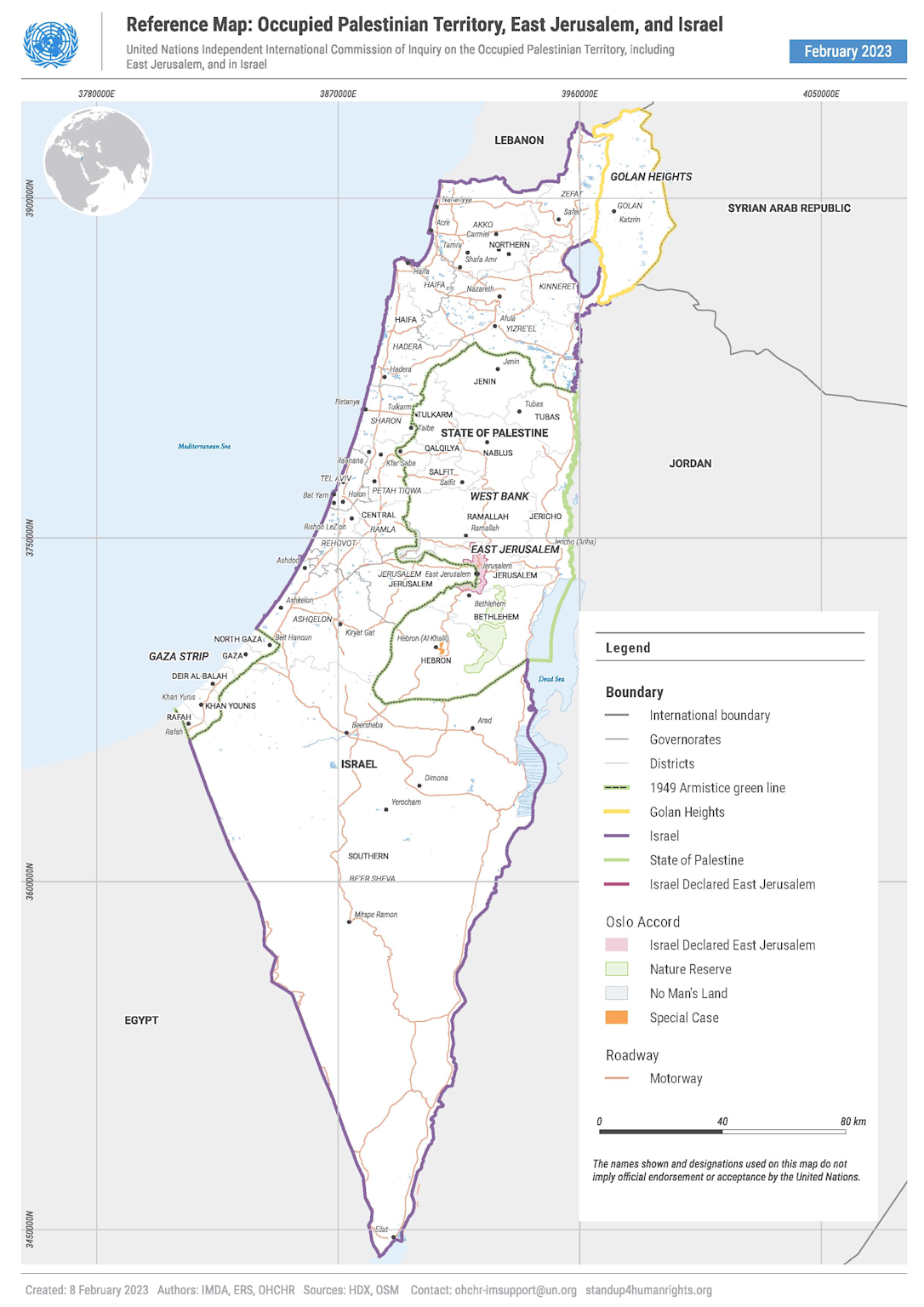
United Nations reference map showing Israeli and Palestinian territories, East Jerusalem, and disputed boundaries as of February 2023
International organizations face pressure to adjust their policies and procedures to accommodate Palestinian state membership and participation. The UN system, international financial institutions, and various treaty organizations must determine how to integrate Palestine while managing objections from Israel and its supporters. These adjustments could affect the functioning of international institutions and create new precedents for disputed state participation in global governance.
Economic and Trade Disruption
The recognition wave creates potential for broader economic disruption beyond bilateral UK-Israel relations, particularly if additional sanctions or trade restrictions are implemented. The threat of secondary sanctions—where countries face economic penalties for maintaining relationships with sanctioned entities—could complicate global trade relationships and supply chains. Israeli companies with significant international operations may face pressure to relocate or restructure their activities to maintain access to recognizing countries’ markets.
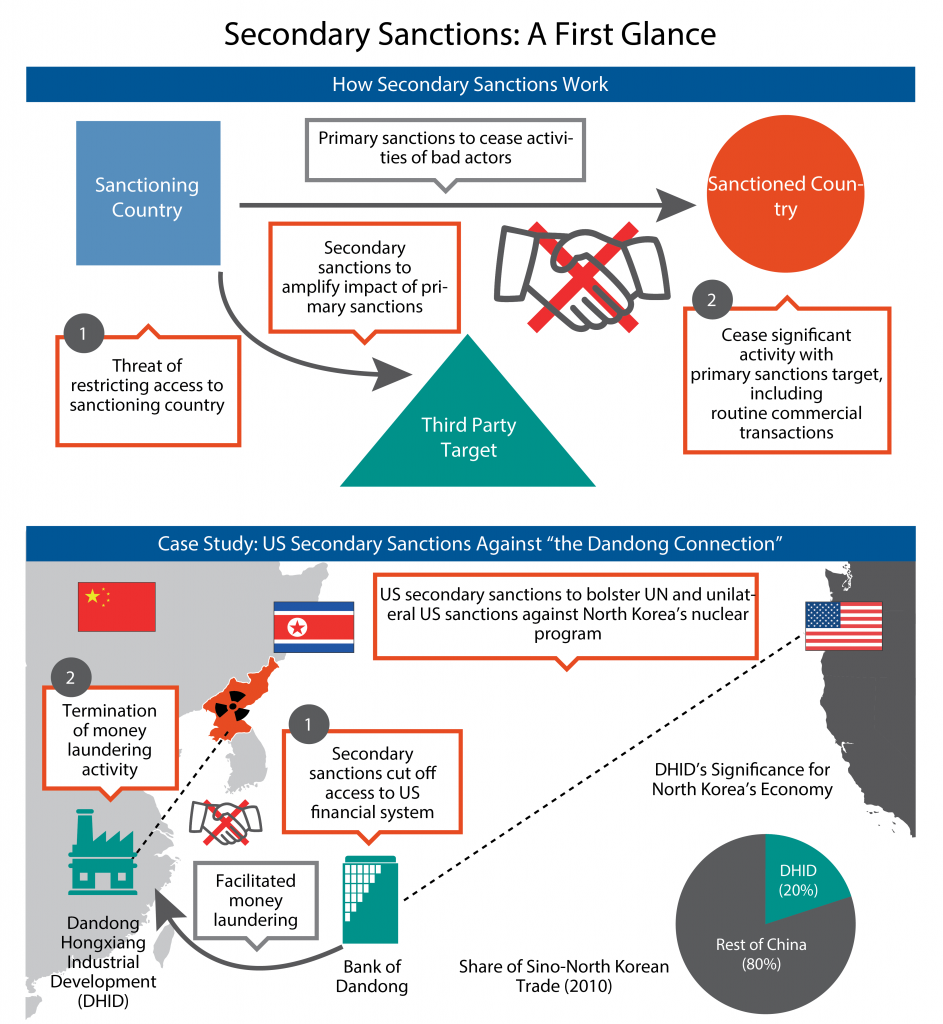
Diagram illustrating how secondary economic sanctions work, with a case study on US sanctions impacting North Korea via China-related financial channels
The potential expansion of BDS campaigns following state recognition could affect Israeli participation in international economic relationships, from investment flows to commercial partnerships. While previous BDS efforts have had limited measurable economic impact, the political momentum generated by state recognition could provide new impetus for grassroots economic pressure. These campaigns could affect Israeli access to international markets, investment capital, and technological cooperation agreements.
Global financial institutions may face pressure to reassess their relationships with Israeli entities, particularly those involved in settlement activities or military operations in recognized Palestinian territories. International banks, investment funds, and insurance companies could face legal and reputational risks for supporting activities that recognizing states consider violations of Palestinian sovereignty. These financial pressures could complement political recognition with economic consequences that affect Israeli development and investment.
Long-term Strategic Assessment
Implications for International Order
The Palestinian recognition wave represents a fundamental challenge to the post-World War II international order, which has been based primarily on American leadership and Western institutional dominance. The willingness of major Western allies to diverge from American policy preferences on such a significant issue suggests a broader trend toward multipolarity and reduced American influence over alliance decision-making. This shift could have implications far beyond the Middle East, affecting Western unity on issues from China to Russia to global economic governance.
The coordinated nature of the recognition decisions demonstrates new forms of international cooperation that bypass traditional alliance structures and American leadership. The ability of middle powers like Canada, Australia, and European states to coordinate significant policy initiatives independently of the United States suggests emerging patterns of international behavior that could reshape global diplomacy. These developments reflect broader trends toward regional leadership and reduced dependence on great power patronage.
The success or failure of the recognition strategy in advancing Palestinian statehood will likely influence future approaches to international conflict resolution and diplomacy. If recognition leads to meaningful progress toward Palestinian independence, it could encourage similar coordinated international pressure campaigns in other conflicts. Conversely, if recognition fails to produce substantive changes, it could discredit international law approaches to conflict resolution and encourage more unilateral or military solutions.
Future Scenarios and Trajectories
Several potential scenarios could emerge from the current recognition wave, each with different implications for regional and global stability. The most optimistic scenario involves Israeli acceptance of international pressure leading to genuine negotiations toward a two-state solution, potentially mediated by the recognizing countries and resulting in sustainable peace arrangements. However, this scenario requires significant Israeli policy changes that current government positions make unlikely.
A more probable scenario involves continued polarization, with Israel implementing retaliatory measures including settlement expansion or annexation while recognizing countries impose economic sanctions or restrictions. This trajectory could lead to prolonged international isolation for Israel while potentially destabilizing Palestinian territories and regional relationships. The economic and diplomatic costs for all parties could be substantial, affecting global trade and international cooperation.
The most concerning scenario involves military escalation, either through expanded Israeli operations in Palestinian territories or broader regional conflict involving Iranian proxies and Arab state responses. Such escalation could reverse decades of peace-building efforts and potentially trigger broader international intervention, affecting global security and economic stability. The interconnected nature of modern conflicts means that Middle Eastern instability could have worldwide implications through energy prices, refugee movements, and alliance disruptions.
Conclusion
The UK’s recognition of Palestine as a state, alongside similar decisions by Canada, Australia, and other Western nations, represents a watershed moment in international relations that extends far beyond symbolic diplomacy. This coordinated challenge to Israeli policy and American leadership creates multiple layers of complications affecting bilateral relationships, alliance structures, economic partnerships, and the fundamental principles of international order.
For the United Kingdom specifically, recognition carries significant domestic political benefits but substantial international costs, potentially disrupting crucial economic and security relationships while aligning British policy with majority global opinion. The decision reflects changing public attitudes and political pressures while creating new obligations and expectations for British Middle Eastern policy.
The broader implications for Europe, the United States, and the international system suggest that Palestinian recognition may be a catalyst for more fundamental changes in global power arrangements and conflict resolution approaches. The willingness of traditional American allies to coordinate independent initiatives on such a significant issue indicates reduced American influence and emerging patterns of international cooperation that could reshape diplomacy across multiple issue areas.
The Israeli response and regional implications remain highly volatile, with potential for both diplomatic progress and significant escalation depending on policy choices made in Jerusalem, Washington, and other capitals. The recognition wave has created new dynamics that could either advance peace through international pressure or exacerbate conflict through polarization and retaliation.
Ultimately, the complications arising from UK recognition of Palestine reflect deeper tensions in the contemporary international system regarding sovereignty, self-determination, alliance relationships, and the role of international law in resolving conflicts. The resolution of these tensions will likely influence not only the Israeli-Palestinian conflict but broader questions about international order and cooperation in an increasingly multipolar world. The stakes extend well beyond Middle Eastern politics to encompass fundamental questions about the future of international relations and the mechanisms available for addressing global challenges through collective action.
The coming months will be crucial in determining whether the recognition wave generates momentum for genuine diplomatic progress or triggers escalatory responses that further destabilize the region and international relationships. The decisions made by key actors—particularly Israel, the United States, and other major powers—will shape not only the immediate consequences of recognition but the longer-term trajectory of international cooperation and conflict resolution in the 21st century.

